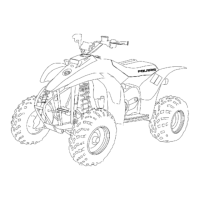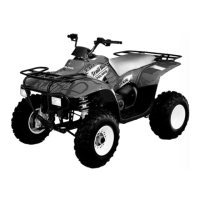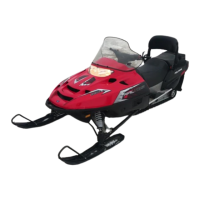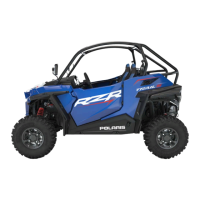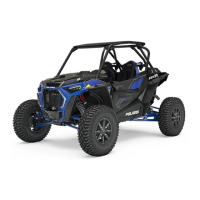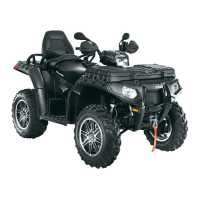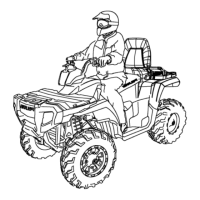How to fix loose battery connections on a Polaris TRAIL BLAZER 330?
- SSteven PalmerSep 3, 2025
To fix loose battery connections on your Polaris Offroad Vehicle, check all connections and tighten them.

How to fix loose battery connections on a Polaris TRAIL BLAZER 330?
To fix loose battery connections on your Polaris Offroad Vehicle, check all connections and tighten them.
What to do if my Polaris Offroad Vehicle has insufficient warm-up when exposed to low ambient temperatures?
If your Polaris Offroad Vehicle has insufficient warm-up when exposed to low ambient temperatures, warm the engine at least 5 minutes. With the transmission in neutral, advance the throttle to about 1/8 throttle in short bursts, 5 to 7 times. The belt will become more flexible and prevent belt burning.
What to do if my Polaris TRAIL BLAZER 330 Offroad Vehicle engine stops or loses power due to overuse of choke?
If your Polaris Offroad Vehicle engine stops or loses power due to overuse of the choke, inspect, clean, and/or replace the spark plugs.
What to do if my Polaris Offroad Vehicle engine stops or loses power due to kinked or plugged fuel vent line?
If your Polaris Offroad Vehicle engine stops or loses power due to a kinked or plugged fuel vent line, inspect and replace it.
What to do if my Polaris TRAIL BLAZER 330 Offroad Vehicle has the wrong or missing belt?
If your Polaris Offroad Vehicle has the wrong or missing belt, always use the recommended belt.
What to do if my Polaris TRAIL BLAZER 330 engine stops or loses power due to loose ignition connections?
Check all connections and tighten
What to do if my Polaris Offroad Vehicle engine stops or loses power because of fouled or defective spark plugs?
If your Polaris Offroad Vehicle engine stops or loses power due to fouled or defective spark plugs, inspect the plugs and replace them if necessary.
What should I do if my Polaris Offroad Vehicle engine stops or loses power and I suspect incorrect fuel?
If your Polaris Offroad Vehicle engine stops or loses power due to incorrect fuel, replace it with the recommended fuel.
What to do if my Polaris TRAIL BLAZER 330 Offroad Vehicle is out of fuel?
If your Polaris Offroad Vehicle is out of fuel, turn the fuel valve to reserve and refuel.
What to do if my Polaris Offroad Vehicle engine stops or loses power due to low battery voltage?
If your Polaris Offroad Vehicle engine stops or loses power due to low battery voltage, recharge the battery to 12.8 VDC.
| Brand | Polaris |
|---|---|
| Model | TRAIL BLAZER 330 |
| Category | Offroad Vehicle |
| Language | English |
Overview of Polaris vehicle and product offerings including snowmobiles and ATVs.
Guidelines for safe operation, potential hazards, and age restrictions.
Explains safety symbols and covers general operator precautions.
Details warnings on passengers, terrain, speed, alcohol, and gear.
Covers modifications, load, water, tires, and frozen water hazards.
Precautions for fuel handling and general safety measures.
Importance and types of protective gear for ATV riders.
Explains override, main, and engine stop switches.
Operation of lights and indicator lights.
Operation of throttle lever and brake lever systems.
Checks for brake fluid level and warnings.
Setting parking brake and function of auxiliary foot brake.
Choke, fuel valve, fuel tank, and fuel filter information.
Gear selector operation and recoil starter use.
Outlines the importance and procedures for the initial break-in period.
Checklist for inspecting the vehicle before each ride.
Step-by-step guide on how to start the ATV engine safely.
Basic procedures for safe ATV operation.
Explains making turns, riding on slippery surfaces, and handling hills.
Driving through water, over obstacles, and in reverse.
How to park on an incline and turn around on a hill.
Noise control, public land operation, and spark arrestor rules.
Crankcase and exhaust emission control system descriptions.
Schedule for regular inspections, adjustments, and lubrication.
Guidance on lubricating components and fluid types.
Procedures for engine oil, transmission oil, and drive chain.
Maintenance for wheels, brakes, steering, lights, and battery.
Spark plug inspection, air filter, and carburetor adjustments.
Spark arrestor service, vehicle cleaning, storage, and battery care.
Capacities, dimensions, engine, and drive system specs.
Charts for jetting and clutch adjustments based on conditions.
List of Polaris part numbers for lubricants, greases, and additives.
Solutions for common drive belt and cover problems.
Troubleshooting for starting, running, knocking, and power loss issues.
Details the limited warranty, coverage, and exclusions.
Steps for obtaining service and procedures for exported vehicles.
Information on the separate USA EPA emissions limited warranty.
Chart to record periodic maintenance dates, mileage, and services performed.
